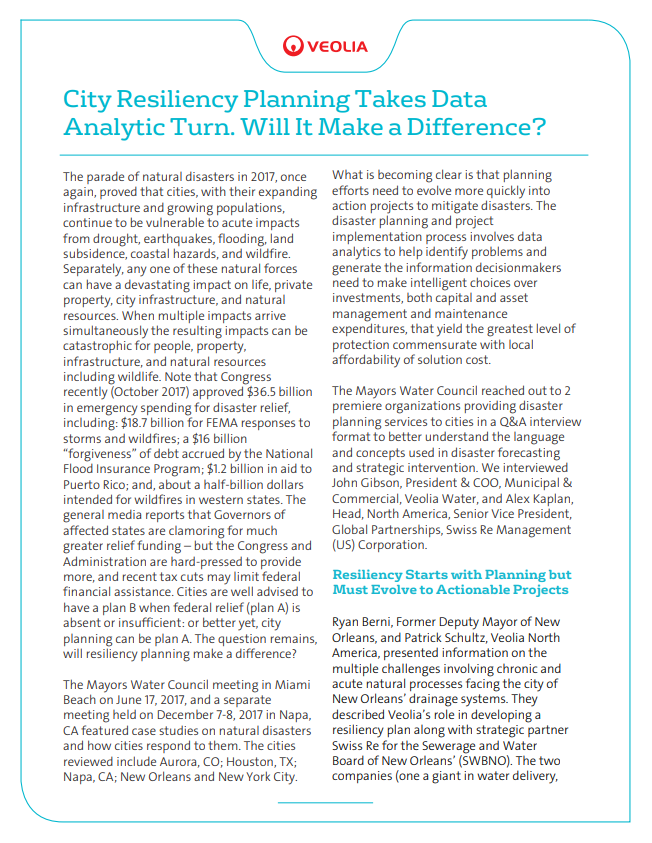Every year, mayors from around the country get together at the United States Mayor’s Conference (USCM) to discuss important, non-partisan national urban policy issues.
Leaders from Veolia North America participated in this year’s conference, alongside 250 mayors and an additional 500 attendees. Among the many important themes discussed, the topic of city resiliency planning was a force across water, energy, disaster recovery and sustainability. Unprecedented climate events with catastrophic losses led to $300 billion-related damage across the U.S. last year, making 2017 the costliest year on record for extreme weather events. It is no surprise that resiliency planning was a big discussion point at this year’s conference.
But make no mistake. Resiliency planning is not a new talking point at the USCM; it continues to spark more discussion and new approaches among mayors across the U.S. Here’s what we learned this year.
The Future of Urban Infrastructure Will be Shaped by City Resiliency Planning
Notable comments surrounding city resiliency planning came from the EPA. David Ross, Assistant Administrator of the EPA’s Water Office, spoke to the Mayors Water Council to provide insight on the Administration’s approach to infrastructure development. The Administration’s approach will be cooperative federalism, an approach that aims to support more programs like the Water Infrastructure Finance and Innovation Act (WIFIA) for infrastructure needs.
In addition, Mayors spoke about the need to consider flood mitigation to prevent infrastructure failure. But what exactly is a resilient city?
What is a Resilient City and How Can It Help Mitigate Damage from Disasters?
A resilient city is able to thrive and adapt in the face of uncertainty from natural disasters. In recent years, natural disasters (Katrina, Sandy, etc.) have devastated major cities, disrupting economy, transportation and utility infrastructure. Part of city resiliency planning means being prepared for the next inevitable natural disaster. It is critical to the sustainability of urban development moving forward.
Disaster planning involves data analytics to identify problems and assist with financial planning for capital, asset management and maintenance expenditures. But, planning and actionable efforts must evolve at the local level. Planning needs to be brought into action to begin mitigating the damage caused by natural disasters. Furthermore, they must yield the greatest level of protection at an affordable cost.
An Ongoing Discussion
In the June 2017 Mayors Water Council Meeting, Ryan Berni, Deputy Mayor of the City of New Orleans, and Patrick Schultz, Principal & General Manager for Resource Optimization at Veolia North America, presented information on the multiple challenges involving chronic and acute natural processes. They described Veolia’s role in developing a resiliency plan along with strategic partner Swiss Re for the Sewerage and Water Board of New Orleans (SWBNO).
Veolia and Swiss Re combined capabilities, according to Schultz, to “conduct a risk evaluation of SWBNO’s critical infrastructure and identify opportunities to protect assets by pre-funding catastrophic losses.” Schultz continues: “meaningful resiliency planning needs to be at the asset level,” noting that SWBNO has 200 key assets.
Veolia and Swiss Re Interview
To help provide clarity to Schultz’s statements, we interviewed John Gibson, COO for Veolia Municipal and Commercial Businesses and Alex Kaplan, Head of North America and Senior Vice President Global Partnerships for Swiss Re Management and asked them the following questions:
- What is meant by “pre-funding catastrophic losses”?
- What does “risk transference mean in resiliency planning”?
- What do you mean by “meaningful resiliency planning needs to be the asset level”?
- Beyond avoiding incident-specific losses, how can resiliency yield public benefits?



